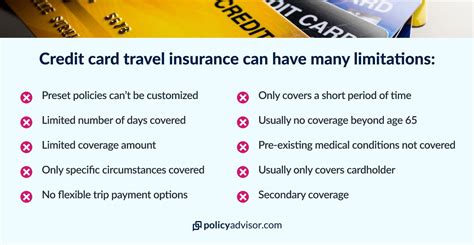Credit Cards And Travel Insurance

Planning a trip and considering the various aspects of travel insurance is crucial for a stress-free journey. While many travelers are aware of the benefits of travel insurance, an often-overlooked aspect is the role that credit cards can play in providing travel protection and insurance coverage. This article explores the relationship between credit cards and travel insurance, delving into the various benefits and considerations to help travelers make informed decisions about their financial protection while exploring the world.
The Connection Between Credit Cards and Travel Insurance

Credit cards have long been recognized as a convenient and secure way to make purchases and manage finances. However, their role extends beyond everyday transactions, especially when it comes to travel. Many credit card issuers offer a range of travel-related benefits, including travel insurance coverage. These insurance benefits can provide valuable protection for travelers, covering various aspects of their journey.
The travel insurance benefits associated with credit cards can vary widely depending on the card issuer, the specific credit card, and the terms and conditions of the insurance policy. It's essential for travelers to understand the coverage they may already have through their credit cards to avoid unnecessary expenses and ensure they have adequate protection.
Understanding Credit Card Travel Insurance Coverage

Credit card travel insurance typically covers a range of scenarios that travelers may encounter during their journeys. These can include trip cancellation or interruption, baggage loss or delay, emergency medical expenses, and rental car coverage, among others. The specific coverage and limitations will depend on the credit card and the insurance provider.
Trip Cancellation and Interruption: One of the most valuable benefits of credit card travel insurance is trip cancellation and interruption coverage. This coverage can reimburse travelers for non-refundable expenses if their trip is canceled or interrupted due to covered reasons. Covered reasons may include illness, injury, or death of the cardholder or a family member, as well as other unforeseen events.
Baggage Loss and Delay: Credit cards often include insurance for baggage loss or delay. If checked luggage is lost, stolen, or delayed, this coverage can provide reimbursement for essential items purchased during the delay or for the cost of replacing lost items. It's important to note that coverage limits and exclusions may apply.
Emergency Medical Expenses: Credit cards can also offer insurance for emergency medical expenses incurred while traveling. This coverage can provide financial protection in the event of unexpected illness or injury, covering expenses such as hospital stays, doctor visits, and prescription medications. However, it's crucial to understand the limits and exclusions of this coverage, as it may not cover pre-existing conditions or certain types of injuries.
Rental Car Coverage: Many credit cards provide rental car insurance, which can waive the collision damage waiver (CDW) or loss damage waiver (LDW) fees charged by rental car companies. This coverage can provide peace of mind for travelers, knowing that their credit card may cover damage or theft of the rental car, subject to the terms and conditions of the insurance policy.
Tips for Maximizing Credit Card Travel Insurance Benefits
To make the most of the travel insurance benefits offered by credit cards, travelers should consider the following tips:
- Review the terms and conditions: Understand the coverage limits, exclusions, and requirements for filing a claim. Pay close attention to any waiting periods or pre-existing condition clauses.
- Use the right credit card: Not all credit cards offer the same travel insurance benefits. Research and choose a credit card that aligns with your travel needs and provides the coverage you require.
- Charge your travel expenses to the card: To be eligible for travel insurance benefits, ensure that your travel-related expenses, such as airfare, hotel stays, and car rentals, are charged to the eligible credit card.
- Read the fine print: Familiarize yourself with the specific terms and conditions of the insurance policy. This includes understanding any deductibles, co-pays, or out-of-pocket expenses that may apply.
- Keep records and receipts: In the event of a claim, you'll need to provide supporting documentation. Keep all travel-related receipts and records organized and easily accessible.
Comparing Credit Card Travel Insurance and Standalone Travel Insurance
While credit card travel insurance can provide valuable benefits, it's essential to understand its limitations and consider whether standalone travel insurance might be a better option for your specific needs.
Standalone travel insurance policies offer comprehensive coverage tailored to the needs of travelers. These policies typically provide broader coverage limits, fewer exclusions, and more flexibility in terms of trip duration and cancellation reasons. Standalone travel insurance may be a better choice for travelers with pre-existing medical conditions, those planning extensive trips, or individuals seeking coverage for adventure sports or high-risk activities.
Factors to Consider When Choosing Between Credit Card and Standalone Travel Insurance
- Coverage limits: Standalone travel insurance policies often provide higher coverage limits for various scenarios, ensuring more extensive financial protection.
- Exclusions and restrictions: Credit card travel insurance may have more exclusions and restrictions compared to standalone policies. Standalone insurance policies can provide coverage for a wider range of situations.
- Trip duration and frequency: If you travel frequently or for extended periods, standalone travel insurance may be more cost-effective and provide continuous coverage.
- Pre-existing conditions: Standalone travel insurance policies often offer coverage for pre-existing medical conditions, which may be excluded from credit card travel insurance.
- Adventure activities: If your trip involves high-risk activities or adventure sports, standalone travel insurance may provide specific coverage for these activities.
Real-Life Examples and Case Studies
To illustrate the impact of credit card travel insurance, let’s explore a few real-life scenarios:
Scenario 1: Trip Cancellation Due to Illness
Imagine you’ve planned a family vacation to an exotic destination. Unfortunately, just before your departure, one of your family members falls ill and is unable to travel. If you’ve charged your non-refundable airfare and accommodations to a credit card with trip cancellation coverage, you may be eligible for reimbursement. This coverage can provide financial relief and help you recoup some of the costs associated with canceling your trip.
Scenario 2: Baggage Delay and Essential Purchases
While on a business trip, your checked luggage is delayed by several days. You need to purchase essential items, such as clothing and toiletries, to continue with your meetings and presentations. If your credit card offers baggage delay coverage, you may be reimbursed for these necessary expenses, ensuring you can focus on your business commitments without worrying about unexpected costs.
Scenario 3: Medical Emergency Abroad
During a solo trip to a remote location, you suffer a severe injury that requires immediate medical attention. If your credit card includes emergency medical coverage, it can provide assistance in coordinating medical care and covering related expenses. This coverage can be a lifeline in situations where accessing healthcare can be challenging and expensive.
Industry Insights and Expert Advice

To gain deeper insights into the world of credit card travel insurance, we spoke with Sarah Wilson, a seasoned travel expert and insurance specialist. Sarah shared her thoughts on maximizing credit card benefits and choosing the right travel insurance coverage.
"Credit card travel insurance can be a fantastic way to enhance your financial protection while traveling," said Sarah. "However, it's crucial to understand the coverage limits and exclusions. Always review the terms and conditions, and don't hesitate to reach out to your credit card issuer for clarification. Additionally, consider your specific travel needs and the potential risks associated with your trip. If you have pre-existing conditions or plan to engage in high-risk activities, standalone travel insurance may provide the comprehensive coverage you require."
Sarah emphasized the importance of staying informed and being proactive. "Stay updated on the latest travel insurance offerings and changes in coverage. Keep a record of your travel expenses and any relevant documentation. In the event of a claim, having organized records can expedite the process and ensure a smoother resolution."
The Future of Credit Card Travel Insurance
As the travel industry continues to evolve, credit card issuers are also adapting their offerings to meet the changing needs of travelers. Credit card travel insurance is likely to become even more comprehensive and tailored to specific traveler profiles. We can expect to see enhanced coverage for medical emergencies, trip cancellations, and baggage protection, as well as the inclusion of benefits relevant to the digital nomad lifestyle, such as device protection and remote work-related expenses.
Additionally, credit card issuers may partner with travel insurance providers to offer more specialized coverage options, catering to niche travel markets and unique travel experiences. This could include coverage for extreme sports, luxury travel, or extended stays abroad.
What are some common exclusions in credit card travel insurance policies?
+
Common exclusions in credit card travel insurance policies may include pre-existing medical conditions, high-risk activities like skydiving or bungee jumping, damage to personal items, and intentional acts. It’s important to review the specific exclusions listed in your policy.
How do I file a claim for credit card travel insurance benefits?
+
To file a claim, you typically need to contact the credit card issuer’s insurance provider and provide supporting documentation, such as receipts, travel itineraries, and any relevant medical records. Follow the specific claim filing process outlined in your policy.
Can I combine credit card travel insurance with my existing travel insurance policy?
+
Yes, you can often combine credit card travel insurance with your existing travel insurance policy. This can provide additional layers of protection and coverage for different aspects of your trip. However, be sure to review the terms and conditions of both policies to avoid duplicate coverage.
Are there any credit cards that offer enhanced travel insurance benefits?
+
Yes, certain premium credit cards offer enhanced travel insurance benefits, including higher coverage limits, broader coverage, and fewer exclusions. These cards often come with annual fees, but the increased benefits can make them worthwhile for frequent travelers.
How can I find out more about the travel insurance benefits offered by my credit card?
+
You can find detailed information about the travel insurance benefits of your credit card by reviewing the card’s terms and conditions, visiting the credit card issuer’s website, or contacting their customer support. They can provide you with specific details about the coverage, limits, and exclusions.



